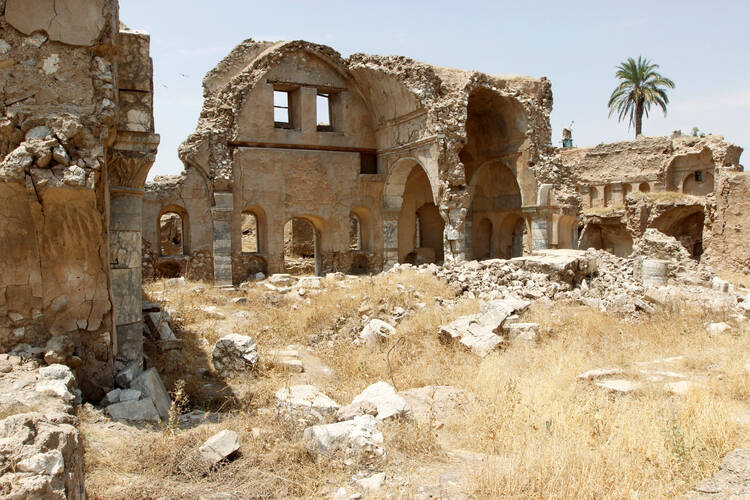WASHINGTON (CNS) -- Although life in Iraq for Christians has stabilized since the routing of Islamic State from the country, their numbers are down from 2014, when the militant group began its insurgency, with their towns largely wrecked and infrastructure in shambles.
This was the assessment of panelists at a Nov. 28 roundtable in Washington sponsored by the Knights of Columbus in recognition of a week of "Solidarity in Suffering" declared by the U.S. Catholic Church that began Nov. 26 to raise awareness of the situation of persecuted Christians throughout the world.
Chaldean Archbishop Bashar Matti Warda of Irbil, Iraq, in the Kurdistan region in the country's north, said in 2014, when Islamic State made its first territorial gains, "we found ourselves suddenly caring for 15,000 Christian families, not including Yezidis," another religious minority native to the Ninevah Plains in the region. The Christians had fled from their homes further south in Iraq; the United States last year said the Islamic State's atrocities in the region constituted genocide.
"Now he is helping as many as possible move back to their homes," said Carl Anderson, supreme knight of the Knights of Columbus.
The United States last year said the Islamic State's atrocities in the region constituted genocide.
First will come immediate needs. Stephen Rasche, who is president of the Ninevah Reconstruction Committee and doubles as the Irbil Archdiocese's general counsel, said reconstruction work is like "triage."
Power and water are immediate needs, Rasche said. But first, Iraqi Christians need to move back to their homes to get those essentials restored. And, once there, they will need to find "work, economic sustenance," he added.
So far, the committee has received $2 million from Hungary to restore Christian areas, and is counting on another $4 million from the U.S. government and private sources. Reconstruction will have to take place on "a town-by-town basis," Rasche said. The Knights have raised $2 million in an initiative to rebuild Karamles, a predominately Christian town in Ninevah that was previously under Islamic State control.
Rasche added that Iraq had about 1.5 million Christians at the start of the U.S.-led war against Iraq in 2003. Now, that number has dipped to 300,000, while some estimates place it as low as 175,000.
One overarching goal is "keeping peace in our villages," said Father Salar Kajo, a parish priest in Teleskof, Iraq. Father Kajo is credited with brokering a peace accord this fall between Iraqi government forces and the Peshmerga fighters of Kurdistan, which had recently declared its independence from Iraq but whose breakaway bid has met with a chilly reception by other nations.
Iraq had about 1.5 million Christians at the start of the U.S.-led war against Iraq in 2003. Now, that number has dipped to 300,000, while some estimates place it as low as 175,000.
"Knowing we are not forgotten gives us hope," said Archbishop Warda, who later added that prayer and continued conversation and outreach by Christians in the West will do much to improve the situation of Iraqi Christians.
Anderson mentioned a Pew Research Center report that said Christians are targeted in more countries than any other faith, and Pope Francis' comment that there are "more martyrs today than in Christianity's first centuries."
While aid is welcome, Rasche said, "the hour is well past midnight" for Iraqi Christians. Archbishop Warda concurred, saying that after three-and-a-half years of attacks by Islamic State, "we cannot afford" a fresh outbreak of violence, which could send Iraqi Christians fleeing their homeland for good.
Rasche said he does not want to see the Christian presence in Iraq shrink to a relative handful, "just caretakers of holy sites," he said.
Anderson said that, irrespective of legislation, nations need to reread Article 18 of the United Nations' Universal Declaration of Human Rights, which says: "Everyone has the right to freedom of thought, conscience and religion; this right includes freedom to change his religion or belief, and freedom, either alone or in community with others and in public or private, to manifest his religion or belief in teaching, practice, worship and observance."
"A community that has been there nearly 2,000 years -- 600 years before Islam -- has the right to stay in their own land," Anderson said.









